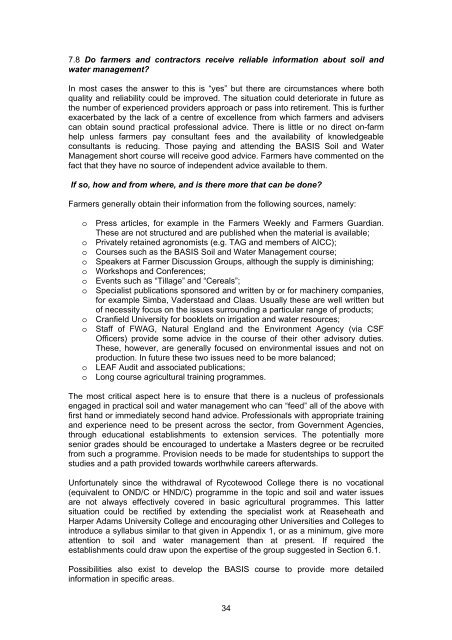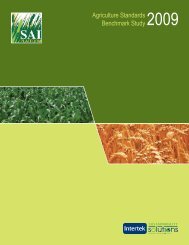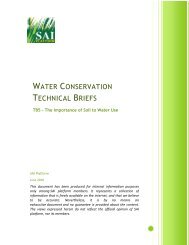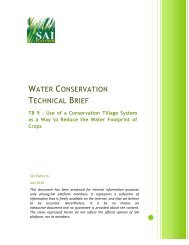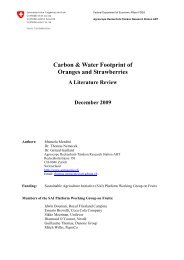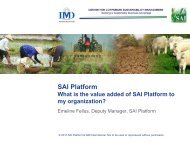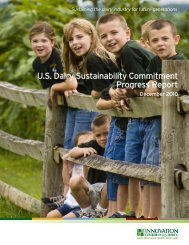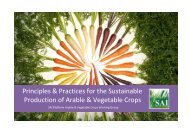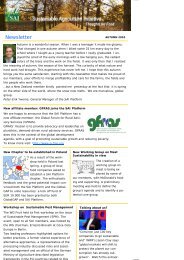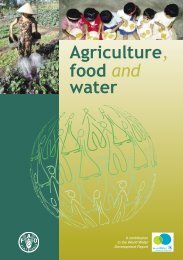The Current Status of Soil and Water Management in England
The Current Status of Soil and Water Management in England
The Current Status of Soil and Water Management in England
You also want an ePaper? Increase the reach of your titles
YUMPU automatically turns print PDFs into web optimized ePapers that Google loves.
7.8 Do farmers <strong>and</strong> contractors receive reliable <strong>in</strong>formation about soil <strong>and</strong><br />
water management?<br />
In most cases the answer to this is “yes” but there are circumstances where both<br />
quality <strong>and</strong> reliability could be improved. <strong>The</strong> situation could deteriorate <strong>in</strong> future as<br />
the number <strong>of</strong> experienced providers approach or pass <strong>in</strong>to retirement. This is further<br />
exacerbated by the lack <strong>of</strong> a centre <strong>of</strong> excellence from which farmers <strong>and</strong> advisers<br />
can obta<strong>in</strong> sound practical pr<strong>of</strong>essional advice. <strong>The</strong>re is little or no direct on-farm<br />
help unless farmers pay consultant fees <strong>and</strong> the availability <strong>of</strong> knowledgeable<br />
consultants is reduc<strong>in</strong>g. Those pay<strong>in</strong>g <strong>and</strong> attend<strong>in</strong>g the BASIS <strong>Soil</strong> <strong>and</strong> <strong>Water</strong><br />
<strong>Management</strong> short course will receive good advice. Farmers have commented on the<br />
fact that they have no source <strong>of</strong> <strong>in</strong>dependent advice available to them.<br />
If so, how <strong>and</strong> from where, <strong>and</strong> is there more that can be done?<br />
Farmers generally obta<strong>in</strong> their <strong>in</strong>formation from the follow<strong>in</strong>g sources, namely:<br />
o Press articles, for example <strong>in</strong> the Farmers Weekly <strong>and</strong> Farmers Guardian.<br />
<strong>The</strong>se are not structured <strong>and</strong> are published when the material is available;<br />
o Privately reta<strong>in</strong>ed agronomists (e.g. TAG <strong>and</strong> members <strong>of</strong> AICC);<br />
o Courses such as the BASIS <strong>Soil</strong> <strong>and</strong> <strong>Water</strong> <strong>Management</strong> course;<br />
o Speakers at Farmer Discussion Groups, although the supply is dim<strong>in</strong>ish<strong>in</strong>g;<br />
o Workshops <strong>and</strong> Conferences;<br />
o Events such as “Tillage” <strong>and</strong> “Cereals”;<br />
o Specialist publications sponsored <strong>and</strong> written by or for mach<strong>in</strong>ery companies,<br />
for example Simba, Vaderstaad <strong>and</strong> Claas. Usually these are well written but<br />
<strong>of</strong> necessity focus on the issues surround<strong>in</strong>g a particular range <strong>of</strong> products;<br />
o Cranfield University for booklets on irrigation <strong>and</strong> water resources;<br />
o Staff <strong>of</strong> FWAG, Natural Engl<strong>and</strong> <strong>and</strong> the Environment Agency (via CSF<br />
Officers) provide some advice <strong>in</strong> the course <strong>of</strong> their other advisory duties.<br />
<strong>The</strong>se, however, are generally focused on environmental issues <strong>and</strong> not on<br />
production. In future these two issues need to be more balanced;<br />
o LEAF Audit <strong>and</strong> associated publications;<br />
o Long course agricultural tra<strong>in</strong><strong>in</strong>g programmes.<br />
<strong>The</strong> most critical aspect here is to ensure that there is a nucleus <strong>of</strong> pr<strong>of</strong>essionals<br />
engaged <strong>in</strong> practical soil <strong>and</strong> water management who can “feed” all <strong>of</strong> the above with<br />
first h<strong>and</strong> or immediately second h<strong>and</strong> advice. Pr<strong>of</strong>essionals with appropriate tra<strong>in</strong><strong>in</strong>g<br />
<strong>and</strong> experience need to be present across the sector, from Government Agencies,<br />
through educational establishments to extension services. <strong>The</strong> potentially more<br />
senior grades should be encouraged to undertake a Masters degree or be recruited<br />
from such a programme. Provision needs to be made for studentships to support the<br />
studies <strong>and</strong> a path provided towards worthwhile careers afterwards.<br />
Unfortunately s<strong>in</strong>ce the withdrawal <strong>of</strong> Rycotewood College there is no vocational<br />
(equivalent to OND/C or HND/C) programme <strong>in</strong> the topic <strong>and</strong> soil <strong>and</strong> water issues<br />
are not always effectively covered <strong>in</strong> basic agricultural programmes. This latter<br />
situation could be rectified by extend<strong>in</strong>g the specialist work at Reaseheath <strong>and</strong><br />
Harper Adams University College <strong>and</strong> encourag<strong>in</strong>g other Universities <strong>and</strong> Colleges to<br />
<strong>in</strong>troduce a syllabus similar to that given <strong>in</strong> Appendix 1, or as a m<strong>in</strong>imum, give more<br />
attention to soil <strong>and</strong> water management than at present. If required the<br />
establishments could draw upon the expertise <strong>of</strong> the group suggested <strong>in</strong> Section 6.1.<br />
Possibilities also exist to develop the BASIS course to provide more detailed<br />
<strong>in</strong>formation <strong>in</strong> specific areas.<br />
34


